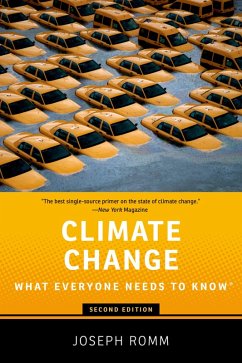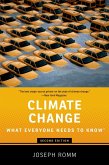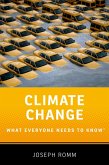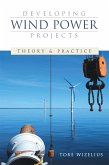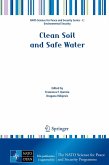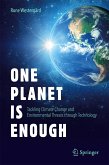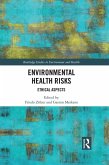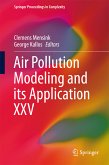

Alle Infos zum eBook verschenken

- Format: PDF
- Merkliste
- Auf die Merkliste
- Bewerten Bewerten
- Teilen
- Produkt teilen
- Produkterinnerung
- Produkterinnerung

Hier können Sie sich einloggen

Bitte loggen Sie sich zunächst in Ihr Kundenkonto ein oder registrieren Sie sich bei bücher.de, um das eBook-Abo tolino select nutzen zu können.
"This is, for my money, the best single-source primer on the state of climate change." - New York Magazine "The right book at the right time: accessible, comprehensive, unflinching, humane." - The Daily Beast "A must-read." - The Guardian The essential primer on what will be the defining issue of our time, Climate Change: What Everyone Needs to Know® is a clear-eyed overview of the science, conflicts, and implications of our warming planet. From Joseph Romm, Chief Science Advisor for National Geographic's Years of Living Dangerously series and one of Rolling Stone's "100 people who are…mehr
- Geräte: PC
- mit Kopierschutz
- eBook Hilfe
- Größe: 13.03MB
![Climate Change (eBook, ePUB) Climate Change (eBook, ePUB)]() Joseph RommClimate Change (eBook, ePUB)7,95 €
Joseph RommClimate Change (eBook, ePUB)7,95 €![Climate Change (eBook, ePUB) Climate Change (eBook, ePUB)]() Joseph RommClimate Change (eBook, ePUB)7,99 €
Joseph RommClimate Change (eBook, ePUB)7,99 €![Developing Wind Power Projects (eBook, PDF) Developing Wind Power Projects (eBook, PDF)]() Tore WizeliusDeveloping Wind Power Projects (eBook, PDF)119,95 €
Tore WizeliusDeveloping Wind Power Projects (eBook, PDF)119,95 €![Clean Soil and Safe Water (eBook, PDF) Clean Soil and Safe Water (eBook, PDF)]() Clean Soil and Safe Water (eBook, PDF)161,95 €
Clean Soil and Safe Water (eBook, PDF)161,95 €![One Planet Is Enough (eBook, PDF) One Planet Is Enough (eBook, PDF)]() Rune WestergårdOne Planet Is Enough (eBook, PDF)27,95 €
Rune WestergårdOne Planet Is Enough (eBook, PDF)27,95 €![Environmental Health Risks (eBook, PDF) Environmental Health Risks (eBook, PDF)]() Environmental Health Risks (eBook, PDF)45,95 €
Environmental Health Risks (eBook, PDF)45,95 €![Air Pollution Modeling and its Application XXV (eBook, PDF) Air Pollution Modeling and its Application XXV (eBook, PDF)]() Air Pollution Modeling and its Application XXV (eBook, PDF)161,95 €
Air Pollution Modeling and its Application XXV (eBook, PDF)161,95 €-
-
-
Dieser Download kann aus rechtlichen Gründen nur mit Rechnungsadresse in A, B, BG, CY, CZ, D, DK, EW, E, FIN, F, GR, HR, H, IRL, I, LT, L, LR, M, NL, PL, P, R, S, SLO, SK ausgeliefert werden.
- Produktdetails
- Verlag: OUP eBook
- Seitenzahl: 328
- Erscheinungstermin: 2. April 2018
- Englisch
- ISBN-13: 9780190866129
- Artikelnr.: 54582915
- Verlag: OUP eBook
- Seitenzahl: 328
- Erscheinungstermin: 2. April 2018
- Englisch
- ISBN-13: 9780190866129
- Artikelnr.: 54582915
- Herstellerkennzeichnung Die Herstellerinformationen sind derzeit nicht verfügbar.
PREFACE: Why You Need To Know About Climate Change
I. Climate Science Basics
What is the greenhouse effect and how does it warm the Earth?
Why are scientists so certain the climate system is warming?
How does global warming increase sea levels and what has been observed to date?
Where does most of human-caused warming go?
What fraction of recent global warming is due to human causes vs. natural causes?
How certain are climate scientists that humans are the primary cause of recent warning?
How do scientists know that recent climate change is primarily caused by human activities?
Why has the climate changed in the past, before there were human-caused greenhouse gas emissions?
What are the climate system's amplifying feedbacks, which turn a moderate initial warming into a big ultimate warming?
Is the current level of atmospheric CO2 concentration unprecedented in human history?
Are recent climatic changes unprecedented?
Has recent human-caused climate change been occurring faster or not as fast as scientists predicted?
Is there a difference between global warming and climate change?
What are the sources of the most important human-caused pollutants that drive global warming?
How does deforestation contribute to warming?
What is Global Warming Potential and why it is different for various greenhouse gases?
Why does the rate of warming appear to vary from decade to decade?
Has global warming slowed down or paused in recent years?
Can we reach a point where emitting more CO2 into the air will not cause more climate change?
Have we already crossed tipping points (points of no return) in the climate system?
II. Extreme Weather and Climate Change
What is the difference between weather and climate?
Which extreme weather events are being made worse by climate change, and which are not?
What is the role of natural climatic variation, such as the El Nino-La Nina cycle, in extreme weather?
Did climate change cause hurricane Sandy (and why is that the wrong question to ask)?
How does climate change affect heat waves?
How does climate change affect droughts?
How does climate change affect wildfires?
How does climate change affect the chances of deluges or severe precipitation?
Does climate change mean more snow or less, worse snow storms or weaker ones?
How does climate change affect storm surge?
Is climate change making hurricanes more destructive?
What is Arctic amplification?
Is Arctic amplification affecting extreme weather in the northern hemisphere?
Is climate change affecting tornado formation?
In a warming world, why do some winters still seem unusually severe?
III. Projected Climate Impacts
What kind of impacts can we expect this century from business-as-usual climate change?
What are the biggest sources of uncertainty in projecting future global warming? What do previous hot periods in Earth's climate tell us about what the future may hold in store?
How could the thawing permafrost speed up global warming beyond what climate models have projected?
How could an increase in wildfires speed up global warming beyond what climate models have projected?
What are some other key positive or amplifying feedbacks affecting the climate system?
What will the impacts of sea level rise be?
How will climate change lead to more destructive superstorms this century?
What kind of droughts can we expect this century?
What are the expected health impacts of climate change?
How does global warming affect human productivity?
Does carbon dioxide at exposure levels expected this century have any direct impacts on human health or cognition?
What is ocean acidification and why does it matter to sea life?
What is biodiversity, and how will climate change impact it?
How will climate change affect the agricultural sector and our ability to feed the world's growing population?
How is climate change a threat to national, regional, and global security threat?
What is the plausible best-case scenario for climate change this century?
What is the plausible worst-case scenario for climate change this century?
What do scientists mean by irreversible impacts and why are they such a concern with climate change?
IV. Avoiding The Worst Impacts
What is the biggest source of confusion about what humanity needs to do to avoid the worst climate impacts?
What is the United Nations Framework Convention on Climate Change?
Why did scientists and governments decide 2DGC (3.6DGF) was the limit beyond which climate change becomes dangerous to humanity?
What kind of greenhouse gas emissions reductions are needed to achieve a 2C target?
What would the economic cost of meeting the 2C target be?
What happens if we miss the 2C target?
Can we adapt to human-caused climate change?
What is geo-engineering and can it play a major role in reducing the impact of climate change?
V. Climate Politics and Policies
What climate policies are governments around the world using to fight climate change?
What is a carbon tax?
What are cap-and-trade and carbon trading?
What is China doing to restrict carbon dioxide emissions?
What is the United States doing to restrict carbon dioxide emissions?
How do different political parties view climate science and policies in the United States and around the world?
Is there are a large-scale effort to spread misinformation on climate science and if so, who funds it?
What are climate science deniers?
VI. The Role of Clean Energy
What kind of changes in our energy system would a 2C target require?
What is energy efficiency and what role will it play?
Will nuclear power be a major factor in the effort to minimize climate change?
What role does natural gas have in the right transition to a 2C world?
How much can solar power contribute to averting dangerous climate change?
How big a role will windpower play in averting dangerous climate change?
What is carbon capture and storage (aka carbon sequestration) and what role can it play?
What is bio-energy and what is its role in cutting carbon pollution?
What other carbon-free forms of energy can contribute to cutting greenhouse gas emissions?
How can we reduce carbon dioxide emissions in the transportation sector?
What challenges have limited the marketplace success of alternative fuels and alternative fuel vehicles to date?
What role can electric vehicles play?
What are hydrogen fuel cells and hydrogen fuel cell vehicles?
What are the challenges facing hydrogen fuel cell vehicles as a climate solution?
What role can energy storage play in the clean energy transition?
What can the agricultural and livestock sector do to minimize climate change
What is energy conservation and what role can it play?
VII. Climate Change and You
How will climate change impact you and your family in the coming decades?
How might climate change affect the future price of coastal property?
How might climate change affect decisions about where to live and retire in the coming decades?
What should students study today if they want to prepare themselves for working in a globally warmed world?
Should climate change affect how you invest for the future?
How can you reduce your carbon footprint?
What role can dietary changes play in reducing your carbon footprint?
What is the best way to talk to someone who does not accept the growing body of evidence on climate science?
PRIMARY SOURCES
ENDNOTES
INDEX
PREFACE: Why You Need To Know About Climate Change
I. Climate Science Basics
What is the greenhouse effect and how does it warm the Earth?
Why are scientists so certain the climate system is warming?
How does global warming increase sea levels and what has been observed to date?
Where does most of human-caused warming go?
What fraction of recent global warming is due to human causes vs. natural causes?
How certain are climate scientists that humans are the primary cause of recent warning?
How do scientists know that recent climate change is primarily caused by human activities?
Why has the climate changed in the past, before there were human-caused greenhouse gas emissions?
What are the climate system's amplifying feedbacks, which turn a moderate initial warming into a big ultimate warming?
Is the current level of atmospheric CO2 concentration unprecedented in human history?
Are recent climatic changes unprecedented?
Has recent human-caused climate change been occurring faster or not as fast as scientists predicted?
Is there a difference between global warming and climate change?
What are the sources of the most important human-caused pollutants that drive global warming?
How does deforestation contribute to warming?
What is Global Warming Potential and why it is different for various greenhouse gases?
Why does the rate of warming appear to vary from decade to decade?
Has global warming slowed down or paused in recent years?
Can we reach a point where emitting more CO2 into the air will not cause more climate change?
Have we already crossed tipping points (points of no return) in the climate system?
II. Extreme Weather and Climate Change
What is the difference between weather and climate?
Which extreme weather events are being made worse by climate change, and which are not?
What is the role of natural climatic variation, such as the El Nino-La Nina cycle, in extreme weather?
Did climate change cause hurricane Sandy (and why is that the wrong question to ask)?
How does climate change affect heat waves?
How does climate change affect droughts?
How does climate change affect wildfires?
How does climate change affect the chances of deluges or severe precipitation?
Does climate change mean more snow or less, worse snow storms or weaker ones?
How does climate change affect storm surge?
Is climate change making hurricanes more destructive?
What is Arctic amplification?
Is Arctic amplification affecting extreme weather in the northern hemisphere?
Is climate change affecting tornado formation?
In a warming world, why do some winters still seem unusually severe?
III. Projected Climate Impacts
What kind of impacts can we expect this century from business-as-usual climate change?
What are the biggest sources of uncertainty in projecting future global warming? What do previous hot periods in Earth's climate tell us about what the future may hold in store?
How could the thawing permafrost speed up global warming beyond what climate models have projected?
How could an increase in wildfires speed up global warming beyond what climate models have projected?
What are some other key positive or amplifying feedbacks affecting the climate system?
What will the impacts of sea level rise be?
How will climate change lead to more destructive superstorms this century?
What kind of droughts can we expect this century?
What are the expected health impacts of climate change?
How does global warming affect human productivity?
Does carbon dioxide at exposure levels expected this century have any direct impacts on human health or cognition?
What is ocean acidification and why does it matter to sea life?
What is biodiversity, and how will climate change impact it?
How will climate change affect the agricultural sector and our ability to feed the world's growing population?
How is climate change a threat to national, regional, and global security threat?
What is the plausible best-case scenario for climate change this century?
What is the plausible worst-case scenario for climate change this century?
What do scientists mean by irreversible impacts and why are they such a concern with climate change?
IV. Avoiding The Worst Impacts
What is the biggest source of confusion about what humanity needs to do to avoid the worst climate impacts?
What is the United Nations Framework Convention on Climate Change?
Why did scientists and governments decide 2DGC (3.6DGF) was the limit beyond which climate change becomes dangerous to humanity?
What kind of greenhouse gas emissions reductions are needed to achieve a 2C target?
What would the economic cost of meeting the 2C target be?
What happens if we miss the 2C target?
Can we adapt to human-caused climate change?
What is geo-engineering and can it play a major role in reducing the impact of climate change?
V. Climate Politics and Policies
What climate policies are governments around the world using to fight climate change?
What is a carbon tax?
What are cap-and-trade and carbon trading?
What is China doing to restrict carbon dioxide emissions?
What is the United States doing to restrict carbon dioxide emissions?
How do different political parties view climate science and policies in the United States and around the world?
Is there are a large-scale effort to spread misinformation on climate science and if so, who funds it?
What are climate science deniers?
VI. The Role of Clean Energy
What kind of changes in our energy system would a 2C target require?
What is energy efficiency and what role will it play?
Will nuclear power be a major factor in the effort to minimize climate change?
What role does natural gas have in the right transition to a 2C world?
How much can solar power contribute to averting dangerous climate change?
How big a role will windpower play in averting dangerous climate change?
What is carbon capture and storage (aka carbon sequestration) and what role can it play?
What is bio-energy and what is its role in cutting carbon pollution?
What other carbon-free forms of energy can contribute to cutting greenhouse gas emissions?
How can we reduce carbon dioxide emissions in the transportation sector?
What challenges have limited the marketplace success of alternative fuels and alternative fuel vehicles to date?
What role can electric vehicles play?
What are hydrogen fuel cells and hydrogen fuel cell vehicles?
What are the challenges facing hydrogen fuel cell vehicles as a climate solution?
What role can energy storage play in the clean energy transition?
What can the agricultural and livestock sector do to minimize climate change
What is energy conservation and what role can it play?
VII. Climate Change and You
How will climate change impact you and your family in the coming decades?
How might climate change affect the future price of coastal property?
How might climate change affect decisions about where to live and retire in the coming decades?
What should students study today if they want to prepare themselves for working in a globally warmed world?
Should climate change affect how you invest for the future?
How can you reduce your carbon footprint?
What role can dietary changes play in reducing your carbon footprint?
What is the best way to talk to someone who does not accept the growing body of evidence on climate science?
PRIMARY SOURCES
ENDNOTES
INDEX
